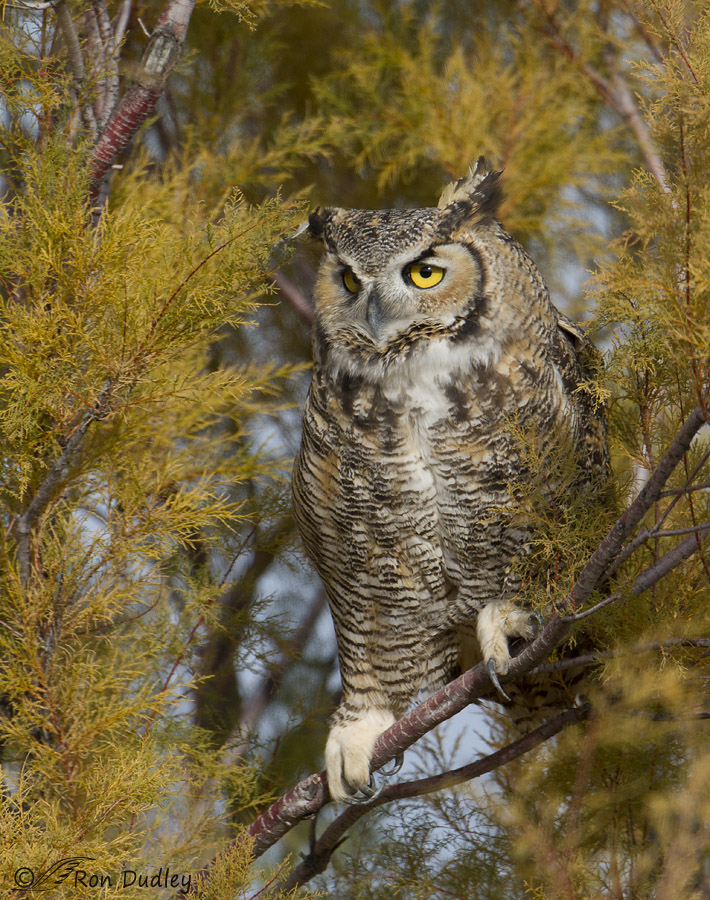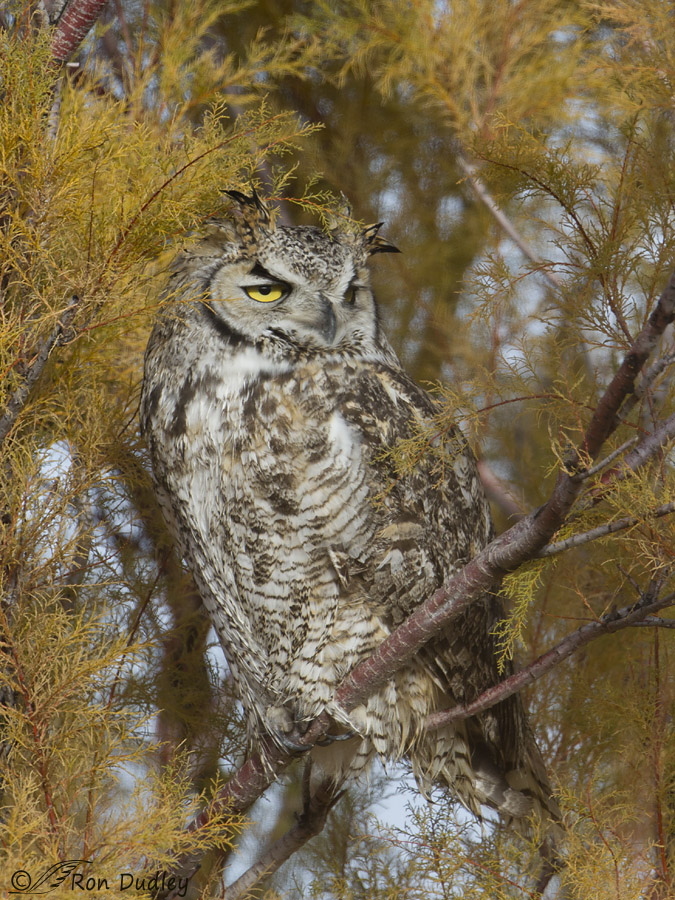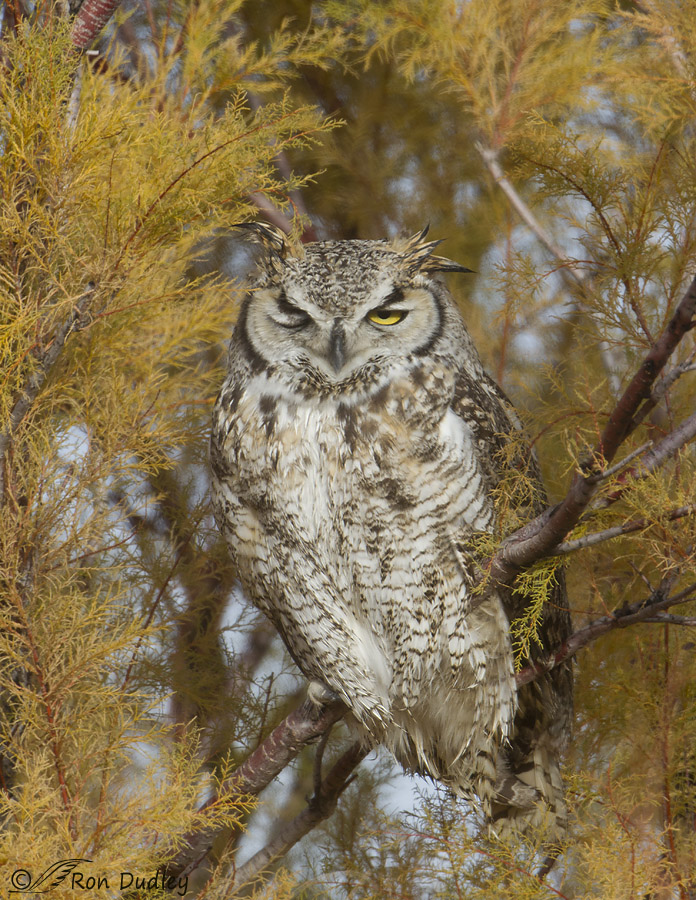Tamarisk may be invasive but it can make a nice setting for a Great Horned Owl. Or Two.

1/2500, f/6.3, ISO 400, Canon 7D, Canon EF500mm f/4L IS USM +1.4 tc, not baited, set up or called in
I photographed this owl several years ago in some Antelope Island tamarisk. I posted a different image of this bird some time ago with the owl looking directly at the viewer. I used to prefer images of owls looking straight at me but my tastes are changing in that regard. Even though we miss that great look at both owl-eyes I like the variety of the bird looking to the side, especially since most owl images we see have the bird looking straight ahead. And I enjoy it when the bird is looking at something other than the photographer.
I like the look at those impressive and powerful feet and talons. Research shows that it takes a force of 13 kg to open them which is part of the reason they often take prey larger than themselves, even the occasional Great Blue Heron.
Eleven days after this image was taken…

1/800, f/8, ISO 500, Canon 7D, Canon EF500mm f/4L IS USM +1.4 tc, not baited, set up or called in
I photographed the owl in the same tree and on the same branch (it was a little bedraggled because it was wet from dew). At least I assumed (for much too long) that it was the same owl. It wasn’t. Eventually closer inspection of the images revealed that they were two different birds – notice that this one is significantly lighter in color than the first bird and its markings are different. I suspect that they may have been a mated pair. Neither bird moved around on the perch a lot so I didn’t get much variety in poses but…

1/8000, f/8, ISO 500, Canon 7D, Canon EF500mm f/4L IS USM +1.4 tc, not baited, set up or called in
the second owl did wink at me once.
Must have been the female…
Ron
Note: Since these images were taken this grove of tamarisk has been cut down, apparently in an effort to control the invasive.


Absolutely stunning shots Ron. I was wondering if you lead photography tours?
Thank you, Cori. Sorry, but no, I do not.
Gorgeous and beautifully detailed shots Ron! Thanks for sharing!
Charlotte
Gorgeous and beautifully detailed shots Ron! Thanks for sharing!
Charlotte
Captivating eyes, terrifying feet!
You’ve got that right, Mike!
Beautiful photos of beautiful owls, Ron. Thank you.
Thanks, Debbie.
Hi Ron,
I’ve enjoyed these images and use them as reference ever since I discovered a nesting pair of Great Horned owls in the neighborhood a few years back. Your work is always worthy of emulating. Thanks for sharing!
What I’ve noticed recently while photographing a Long-eared owl is a band of, what appears to be, out of focus or somewhat blurred area in the lower neck area. I see it in these images as well. A camouflage adaption most likely to assist in breaking visual continuity, but it almost looks as if it’s been slightly blurred in Photoshop (heaven forbid). Have you ever noticed this before?
Still looking for that Harrier Plate.
Neil
Interesting observation, Neil, and I see what you mean. No, I hadn’t noticed it before.
Oh I love these photos! I never get tired of seeing Owls of any kind. We have a pair of great horned Owls that nest/live in our neighborhood. I love hearing them at night. There were several clumps of Tamerisk in my backyard when I bought my house. I cut them down too even tho I did like those pretty pink blooms & the ferny foliage.
We do have a love/hate relationship with Tamarisk, don’t we, Kathleen?
Wonderful images ! I’m a westerner, born and bred, and I DO WISH that Tamarisk wasn’t such pretty stuff ! Not only is it invasive, it’s a water-hog ( its common nickname name is “salt cedar”) , and in
this time of awful drought , is even more of a threat . Nevertheless, it’s feathery and beautiful , especially when it’s in bloom……. Glad it’s serving owls for habitat.
I have mixed feelings about Tamerisk too, Kris, (as I do about phragmites) but both are invasive and cause huge problems so in balance I wish they weren’t here…
Beautiful images, Ron!
Thank you, Annie.
I really like how the color of the tamarisk is also in the color of the owl’s eye. It makes for a lovely picture.
I like these colors, and setting, too, Arwen. Thank you.
Wonderful pictures of one of my many “favorite” big birds….love the feathery bird, feathery foliage effect. Especially like the first two, angled shots…love colors and composition of all three.
Thanks very much, Patty.
Fun pictures. I’m sure it was the female who winked at you! I envy those who can see owls. I don’t seem to be able to see them even when others do.
I envy those who can see owls. I don’t seem to be able to see them even when others do.
Tamarisks are extremely invasive and difficult to get rid of, and I know we have a problem with them here.
Tamarisks are a huge problem out west, Susan. I can understand why they don’t want them to become entrenched on the island but I must admit that I miss this stand of them because there aren’t many trees on the island so the birds perched in them often.
Love this series. I love to see owls, but not very fortunate in this regard. Only have seen one in wild so far. Hoping to buy a good lens some day and be able to find some more in my life.
Thank you Ron for this wonderful photos. I want to share this blog with my father, who is in India. Do you think if I copy this url and send him the email, he will be able to open it there?
I hope you get the lens of your dreams one day, Rima. Yes, your father should be able to open the link if you send it the way you’ve described.
Thank you Ron! I just sent him.
Hope it works, Rima. It should…
Beautiful shots. I agree about the gaze. Looking somewhere other than straight at you gives a much more natural appearance.
“Looking somewhere other than straight at you gives a much more natural appearance.”
Exactly, Larry.
Love your photos of the Owls! What time of the year were these taken?
Thanks for sharing
Gary, The first photo was taken on November 11, the second two on November 22. Thank you.
I’ve never been to antelope island. I must get out there to shoot.
Thanks much
Gary
I’m sure you’d enjoy the experience, Gary. Like many places out west it can be either hot or cold for birds but when it’s on it can REALLY be on!